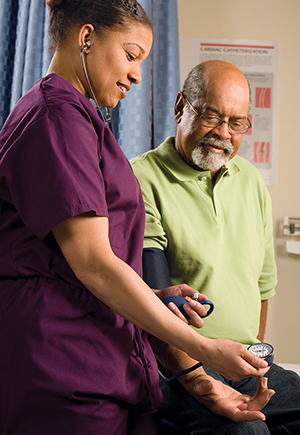An existing health problem can increase your risk for falls. Taking certain kinds of medicines may also raise your risk for falls. So improving your health can help you lower your risk. Work with your health care provider to manage health problems and review your medicines.
How chronic conditions increase your fall risk
Health problems such as diabetes, high or low blood pressure, and arthritis are called chronic health conditions. They can be managed, but they don't go away. They may cause problems with movement, balance, or vision. And certain medicines you take for them may have side effects, such as dizziness or drowsiness. These side effects can also raise your fall risk.
Work with your health care provider
Your health care provider can work with you to help prevent a fall. See your provider each year for a complete health exam. Go more often if you have symptoms such as leg numbness or dizziness that could raise your risk of falling. Let your provider know if you have a history of falls. Bring a list of your medicines with you to review with your provider. Discuss your nutrition and exercise routine. And ask if you need any tests to check your risk of falling.
Review your medicines
Even medicines you buy over the counter can cause side effects that lead to a fall. Common medicines that cause these side effects include those for blood pressure, heart problems, pain, sleep, and depression. If you use pain medicine, store it in a secure area, such as an upper cabinet in your kitchen or bathroom. Don't mix different pills in the same bottle. Always store and travel with medicines in their original containers with clear labels. This will reduce the chance of taking the wrong medicine or too much of a medicine. Taking the wrong dose of a medicine or taking the wrong medicine may cause side effects that can increase your risk of falling.
The way your body reacts to medicines can also change as you age. So certain medicines that were fine in the past may cause side effects now. Your health care provider or pharmacist can help review your medicines and make changes if needed.
Get your eyes and ears checked
Problems with vision or hearing can lead to falls.
-
Get your eyes checked at least once a year. Take time to adjust to new glasses.
-
Get your hearing checked at least every other year.
-
Have your health care provider check for problems that may affect your balance.
Get the right nutrition
If you don't get enough to eat or drink, you can become dizzy and fall.
-
Drink water throughout the day, even if you don't feel thirsty. Your sense of thirst decreases with age.
-
Eat breakfast. Plan regular meals and healthy snacks.
-
Ask your health care provider if you need supplements. These can help strengthen your bones and muscles to help prevent falls. They can also help prevent fractures if you do fall.
-
Don't smoke and limit how much alcohol you drink.
Stay as active as you can
Staying active is one of the best things you can do to prevent falls. Keep in mind that doing too little can be as risky as doing too much. That's because not being active can make you weaker and more likely to fall. Balance, flexibility, strength, and endurance all come from exercise. They all play a role in preventing falls. Ask your health care provider if you have any activity limitations. Talk with your provider about different types and levels of exercises and which ones might be right for you.
When to call your doctor
Contact your health care provider if you fall. Call if you have any of these symptoms. Someone else may need to point them out to you:
-
Feeling lightheaded or dizzy.
-
Losing your balance often or feeling unsteady on your feet.
-
Feeling numbness in your legs or feet, or noticing a change in the way you walk.
-
Having a steady decline in your memory or mental sharpness.
Featured in


